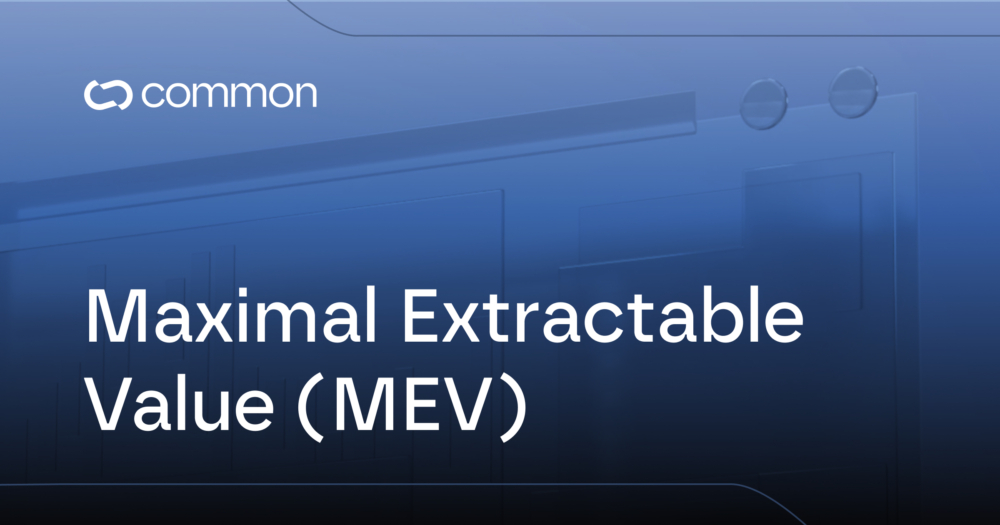One of the advantages of Common’s design and its approach to privacy is that it mitigates the problem of Maximal Extractable Value (MEV). This has been around since the early days of crypto and it affects DeFi market participants in a special way.
Let’s look into the role that MEV plays in web3 and DeFi. Then we’ll look into Common’s unique approach to MEV mitigation on behalf of its market participants.
What is MEV?
MEV is simply understood as the incentive that a network’s miners or validators have to get as much value as possible from their role in proposing new blocks to a chain. This usually plays out as the decision to add, remove, or reorder transactions in a specific way where they earn more money.
The main problem many have with MEV is that it lets miners and validators take advantage of other participants in the network. Their ability to organize transactions to their liking motivates users to pay extra gas fees for urgent transactions and is commonly understood as an “invisible tax” in web3.
Others see MEV as a feature, not a bug. They argue that it can be understood as an inescapable part of DeFi and something that brings efficiency to the market. While this can be a valid approach for some, the mechanics behind MEV can have an objectively negative effect on the desired functionality of certain web3 applications.
(Estimates show that MEV has accounted for a total of over 370,140 ETH in value on Ethereum-based protocols since the Merge alone. This includes and affects DEXes, of course.)
MEV in DEXes
Regardless of the philosophical debate about MEV, DEXes are generally averse to it because it enables front-running.
This is a practice whereby a network participant looks for large trades that are publicly available on the network’s mempool before the transaction is confirmed by the blockchain. Miners or validators are then motivated to place a specific transaction ahead of the transaction for the large trade and benefit at another market participant’s expense.
Front-running, and other variations of it such as sandwiching, create an unfair outcome for the original market participant who placed the large trade. It ultimately makes them less motivated to participate in the DEX if it doesn’t offer proper countermeasures against MEV.
What does Common do about MEV?
Many DEXes employ different workarounds for MEV including slippage limits and fair sequencing services (FSS) for decentralized transaction ordering. One of the most effective strategies is known as batching.
Here, an exchange will take care of market participant’s transactions by settling them off-chain first. Then the exchange will publish these transactions on chain as a batch where their order is irrelevant and miners or validators are not able pick and choose specific transactions depending on the amount of gas fees paid by any participant.
Batching is Common’s choice for an MEV mitigation strategy — albeit with an important twist: added privacy. To understand its unique way of implementing the batching technique, we need to recall what Common is able to do.
On Common, we have an order-book model for implementing a DEX where trades are handled as limit orders that are submitted privately–the amounts and holders are not known at this stage. The orders are matched internally within the batch, and while after this stage the batch becomes public, MEV agents would have it significantly harder to take advantage of them.
The exact process has been explained by Damian Straszak in one of the Aleph Zero Podcast episodes.
It’s important to note, however, that MEV is a complex problem that has not yet been completely eliminated by any DEX. Common’s approach has been to focus on shielding users as much as possible from its negative effects using privacy protections.
Let’s find things in Common
Interested in trying Common for yourself? Join the Common testnet to stress test the DEX in anticipation of the Mainnet launch. You can report your feedback or just start using the dApp. Both AZERO stakers and Common testnet users will be considered for a future CMN airdrop.
Let’s create a private DeFi together. Let’s make financial privacy Common.


